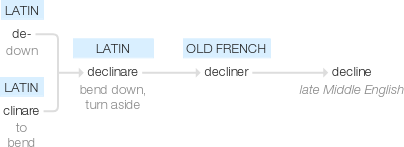Decline
late Middle English: from Old French decliner, from Latin declinare ‘bend down, turn aside’, from de- ‘down’ + clinare ‘to bend’.
wiktionary
From Middle English declinen, from Old French decliner, from Latin declinare(“to bend, turn aside, deflect, inflect, decline”), from de(“down”) + clīnō(“I bend, I incline”), from Proto-Indo-European *ḱley- (English lean).
etymonline
decline (v.)
late 14c., "to turn aside, deviate" (a sense now archaic), also "sink to a lower level," and, figuratively, "fall to an inferior or impaired condition," from Old French decliner "to sink, decline, degenerate, turn aside," from Latin declinare "to lower; avoid, deviate; bend from, inflect," from de "from" (see de-) + clinare "to bend" (from PIE *klein-, suffixed form of root *klei- "to lean").
In grammar, "to inflect as a noun or adjective," from late 14c. The sense has been altered by interpretation of de- as "downward;" intransitive meaning "to bend or slant down" is from c. 1400. Sense of "not to consent, politely refuse or withhold consent to do" is from 1630s. Related: Declined; declining.
decline (n.)
early 14c., "deterioration, degeneration, a sinking into an impaired or inferior condition," from Old French declin, from decliner "to sink, decline, degenerate" (see decline (v.)). Meaning "the time of life when physical and mental powers are failing" is short for decline of life (by 1711).
